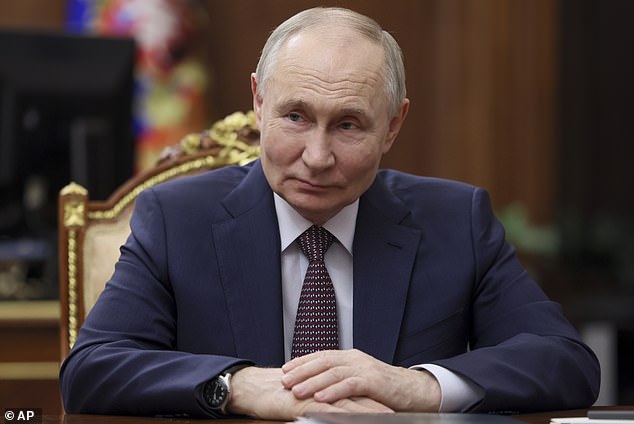Chris Fallica On Trump's Putin Policy: A Strong Denunciation

Table of Contents
Fallica's Criticism of Trump's Appeasement Tactics
Fallica's critique centers on what he perceives as an alarming degree of appeasement towards Vladimir Putin and the Russian government during the Trump administration. This appeasement, he argues, significantly weakened U.S. foreign policy and emboldened Russia's aggressive actions on the global stage.
Evidence of appeasement in Trump's rhetoric and actions.
- Public Praise of Putin: Fallica points to numerous instances where Trump publicly praised Putin's leadership, even in the face of documented human rights abuses and aggressive foreign policy actions. This, Fallica argues, sent a dangerous signal of acceptance and undermined international condemnation of Russia's behavior.
- Hesitation to Sanction Russia: Trump's administration was criticized for its hesitancy to impose meaningful sanctions on Russia, despite repeated violations of international norms and documented interference in U.S. elections. Fallica highlights this reluctance as a clear example of appeasement.
- Withdrawal from International Agreements: Fallica cites Trump's decision to withdraw from the Intermediate-Range Nuclear Forces (INF) Treaty as a further example of appeasement, arguing that it weakened international arms control and benefited Russia.
The dangers of appeasement towards an authoritarian regime like Russia.
- Emboldening Putin: Appeasement, Fallica argues, only emboldens authoritarian leaders like Putin, who are likely to interpret such actions as weakness and a green light for further aggression.
- Undermining Democratic Values: By failing to hold Russia accountable for its actions, Trump's policies, according to Fallica, undermined democratic values and norms globally. This creates a dangerous precedent for other authoritarian regimes.
- Eroding Alliances: Appeasement towards Russia also damaged trust within the U.S.'s alliances, as allies questioned the reliability of the United States as a partner in promoting democratic values and global security.
Fallica's Concerns Regarding Russian Interference in U.S. Elections
A significant aspect of Fallica's criticism focuses on Trump's response to allegations of Russian interference in the 2016 and potentially subsequent U.S. elections.
Analysis of Trump's response to allegations of Russian interference.
- Downplaying the Threat: Fallica highlights instances where Trump publicly downplayed or dismissed intelligence community assessments regarding Russian interference, casting doubt on the integrity of U.S. intelligence agencies.
- Lack of Accountability: Trump's administration was criticized for its perceived lack of robust action to hold Russia accountable for its interference in U.S. elections. Fallica sees this as a failure of leadership and a threat to U.S. democracy.
- Erosion of Public Trust: The ambiguity surrounding the administration's response to Russian interference further eroded public trust in the integrity of the electoral process.
Fallica's suggested countermeasures to Russian interference.
- Strengthening Cybersecurity: Fallica advocates for significant investments in cybersecurity infrastructure to protect U.S. elections from future interference attempts.
- Imposing Stronger Sanctions: He urges for the implementation of stronger and more targeted sanctions against individuals and entities responsible for Russian interference.
- International Cooperation: Fallica emphasizes the need for closer international cooperation to counter Russian disinformation campaigns and other forms of interference.
Fallica's Perspective on NATO and the Transatlantic Alliance
Fallica also expresses deep concern over Trump's perceived weakening of NATO and the transatlantic alliance.
Trump's perceived weakening of NATO under Fallica's analysis.
- Criticism of NATO Allies: Fallica points to Trump's repeated criticism of NATO allies for not meeting their financial commitments, creating divisions within the alliance.
- Uncertainty Regarding U.S. Commitment: Trump's ambiguous statements regarding the U.S.'s commitment to Article 5 of the NATO treaty (collective defense) sowed uncertainty among allies, weakening the alliance's overall deterrent effect.
- Isolationist Rhetoric: Trump's embrace of isolationist rhetoric and his questioning of the benefits of multilateral alliances further undermined the strength and credibility of NATO.
Fallica's views on the importance of maintaining strong transatlantic ties.
- Collective Security: Fallica underlines the crucial role of NATO in providing collective security against threats, including Russia. A weakened NATO is less effective in deterring aggression.
- Shared Values: The transatlantic alliance is based on shared democratic values and principles. A strong alliance promotes these values globally and strengthens the fight against authoritarianism.
- Global Stability: A strong transatlantic alliance is essential for maintaining global stability and addressing shared challenges such as terrorism, climate change, and pandemics.
Conclusion: Understanding Fallica's Strong Denunciation of Trump's Putin Policy – A Call to Action
Chris Fallica's critique of Trump's Russia policy provides a crucial perspective on a critical period in U.S. foreign relations. His analysis highlights the dangers of appeasement, the threat of Russian interference, and the importance of strong transatlantic alliances. Understanding Fallica's insights is essential for navigating the complex challenges posed by Russia's actions on the global stage. Learn more about Chris Fallica's insightful commentary on Trump's Russia policy and join the conversation on effective countermeasures against Putin's influence. Understanding the nuances of this crucial relationship is critical to shaping a strong and effective U.S. foreign policy for the future.

Featured Posts
-
 Google Faces Breakup Demand Over Online Advertising Dominance
May 05, 2025
Google Faces Breakup Demand Over Online Advertising Dominance
May 05, 2025 -
 Georgetown Womans Kentucky Derby Festival Queen Victory
May 05, 2025
Georgetown Womans Kentucky Derby Festival Queen Victory
May 05, 2025 -
 The Trump Tariff Challenge Nicolai Tangens Investment Strategy
May 05, 2025
The Trump Tariff Challenge Nicolai Tangens Investment Strategy
May 05, 2025 -
 Ufc 314 Revised Fight Card After Prates Neal Removal
May 05, 2025
Ufc 314 Revised Fight Card After Prates Neal Removal
May 05, 2025 -
 Indy Cars 2024 Season On Fox What To Expect
May 05, 2025
Indy Cars 2024 Season On Fox What To Expect
May 05, 2025
Latest Posts
-
 Ford Extends Kentucky Derby Partnership A Multi Year Commitment
May 05, 2025
Ford Extends Kentucky Derby Partnership A Multi Year Commitment
May 05, 2025 -
 Bradley Cooper And Will Arnett Behind The Scenes Of Is This Thing On
May 05, 2025
Bradley Cooper And Will Arnett Behind The Scenes Of Is This Thing On
May 05, 2025 -
 Nyc Filming Bradley Cooper Directs Will Arnett For Is This Thing On See The Photos
May 05, 2025
Nyc Filming Bradley Cooper Directs Will Arnett For Is This Thing On See The Photos
May 05, 2025 -
 Nyc Filming Bradley Cooper Directs Will Arnett In New Photos From Is This Thing On
May 05, 2025
Nyc Filming Bradley Cooper Directs Will Arnett In New Photos From Is This Thing On
May 05, 2025 -
 Bradley Cooper Directs Will Arnett On Is This Thing On Nyc Set Photo 5133881
May 05, 2025
Bradley Cooper Directs Will Arnett On Is This Thing On Nyc Set Photo 5133881
May 05, 2025
